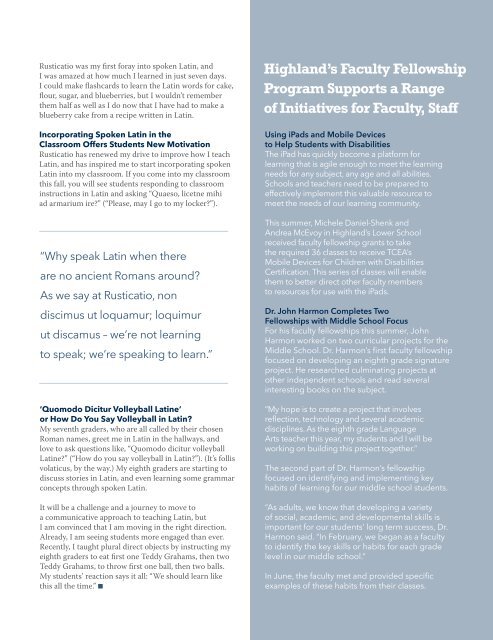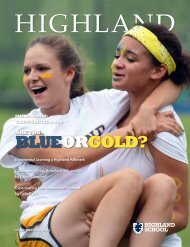HIGHLAND
Create successful ePaper yourself
Turn your PDF publications into a flip-book with our unique Google optimized e-Paper software.
Rusticatio was my first foray into spoken Latin, and<br />
I was amazed at how much I learned in just seven days.<br />
I could make flashcards to learn the Latin words for cake,<br />
flour, sugar, and blueberries, but I wouldn’t remember<br />
them half as well as I do now that I have had to make a<br />
blueberry cake from a recipe written in Latin.<br />
Incorporating Spoken Latin in the<br />
Classroom Offers Students New Motivation<br />
Rusticatio has renewed my drive to improve how I teach<br />
Latin, and has inspired me to start incorporating spoken<br />
Latin into my classroom. If you come into my classroom<br />
this fall, you will see students responding to classroom<br />
instructions in Latin and asking “Quaeso, licetne mihi<br />
ad armarium ire?” (“Please, may I go to my locker?”).<br />
“Why speak Latin when there<br />
are no ancient Romans around?<br />
As we say at Rusticatio, non<br />
discimus ut loquamur; loquimur<br />
ut discamus – we’re not learning<br />
to speak; we’re speaking to learn.”<br />
‘Quomodo Dicitur Volleyball Latine’<br />
or How Do You Say Volleyball in Latin?<br />
My seventh graders, who are all called by their chosen<br />
Roman names, greet me in Latin in the hallways, and<br />
love to ask questions like, “Quomodo dicitur volleyball<br />
Latine?” (“How do you say volleyball in Latin?”). (It’s follis<br />
volaticus, by the way.) My eighth graders are starting to<br />
discuss stories in Latin, and even learning some grammar<br />
concepts through spoken Latin.<br />
It will be a challenge and a journey to move to<br />
a communicative approach to teaching Latin, but<br />
I am convinced that I am moving in the right direction.<br />
Already, I am seeing students more engaged than ever.<br />
Recently, I taught plural direct objects by instructing my<br />
eighth graders to eat first one Teddy Grahams, then two<br />
Teddy Grahams, to throw first one ball, then two balls.<br />
My students’ reaction says it all: “We should learn like<br />
this all the time.” n<br />
Highland’s Faculty Fellowship<br />
Program Supports a Range<br />
of Initiatives for Faculty, Staff<br />
Using iPads and Mobile Devices<br />
to Help Students with Disabilities<br />
The iPad has quickly become a platform for<br />
learning that is agile enough to meet the learning<br />
needs for any subject, any age and all abilities.<br />
Schools and teachers need to be prepared to<br />
effectively implement this valuable resource to<br />
meet the needs of our learning community.<br />
This summer, Michele Daniel-Shenk and<br />
Andrea McEvoy in Highland’s Lower School<br />
received faculty fellowship grants to take<br />
the required 36 classes to receive TCEA’s<br />
Mobile Devices for Children with Disabilities<br />
Certification. This series of classes will enable<br />
them to better direct other faculty members<br />
to resources for use with the iPads.<br />
Dr. John Harmon Completes Two<br />
Fellowships with Middle School Focus<br />
For his faculty fellowships this summer, John<br />
Harmon worked on two curricular projects for the<br />
Middle School. Dr. Harmon’s first faculty fellowship<br />
focused on developing an eighth grade signature<br />
project. He researched culminating projects at<br />
other independent schools and read several<br />
interesting books on the subject.<br />
“My hope is to create a project that involves<br />
reflection, technology and several academic<br />
disciplines. As the eighth grade Language<br />
Arts teacher this year, my students and I will be<br />
working on building this project together.”<br />
The second part of Dr. Harmon’s fellowship<br />
focused on identifying and implementing key<br />
habits of learning for our middle school students.<br />
“As adults, we know that developing a variety<br />
of social, academic, and developmental skills is<br />
important for our students’ long term success, Dr.<br />
Harmon said. “In February, we began as a faculty<br />
to identify the key skills or habits for each grade<br />
level in our middle school.”<br />
In June, the faculty met and provided specific<br />
examples of these habits from their classes.




